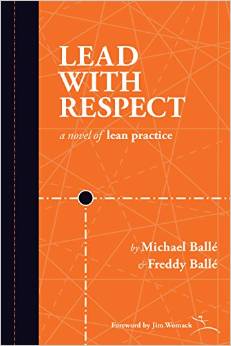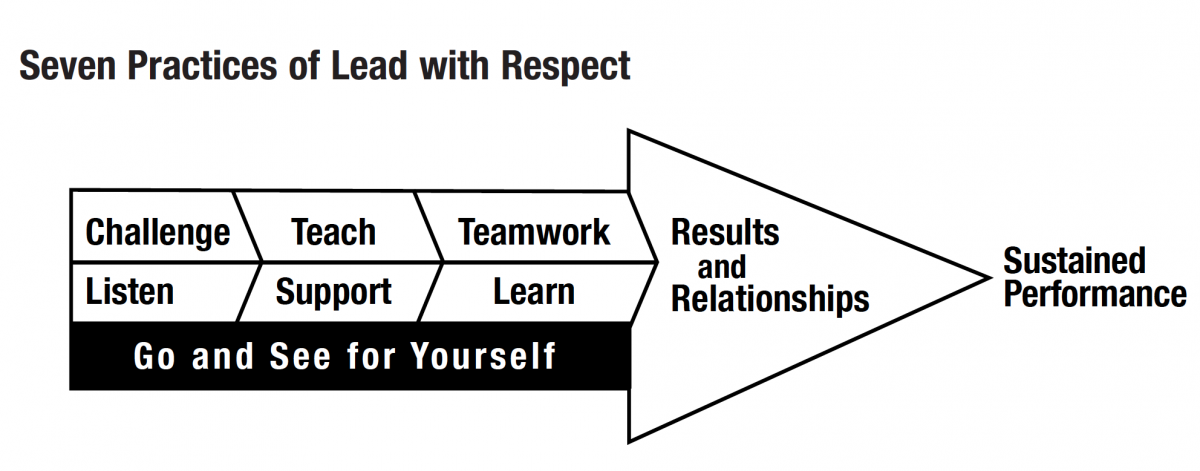Lead with Respect: A Book Review on Leadership & Rediscovering the Gemba

I was always taken by the simplicity and power of Toyota’s model of the Toyota Way. A building with two pillars – respect for people and continuous improvement – defines the company values for success. Much of what we call “lean” or performance improvement focuses on the continuous improvement pillar. Less clear is what it means to lead with respect for people. That comes into focus in the new business novel by Michael Balle, and his dad Freddy, called Lead With Respect. Like their other books, it is told as a story that pulls you in as if you are living the learning process.
In each of their books, there is a teacher that has a deep understanding of lean management, and there are also students including the CEO. In this case, the CEO, Jane Delaney, runs a software company, and they are seriously behind on a project for one of their most important customers whom they cannot seem to satisfy. Andrew Ward, VP of the customer, Nexplas, personally comes to speak to Jane, to her surprise. Why send a VP for a single project? The answer is because he is leading with respect. He wants to see it for himself and see if he can salvage the relationship. That’s right. He does not see this as a vendor of software, but as a relationship which is on the verge of collapse. Out of respect, he wants to try to teach Jane Delaney fast enough to salvage the relationship and her business. He can only do that by starting at the gemba which is where it is happening—the core work of the organization and the places the products and services are being used.

The gemba plays heavily into the book. It is hard to treat someone with respect when you are not around to get to know them, their strengths and weaknesses, how the work is being done, and the processes they are using. We see varying definitions of respect using terms such as: the leader does not belittle people, everyone is treated fairly, and a leader engenders trust. These are all critical to respect, but they can be done from a distance with occasional walks through the company to get to know people’s names and by asking them about their families. Lead With Respect, based on the lean management paradigm pioneered by Toyota, has a higher standard.
The leader must be present in the workplace and obtain an understanding of people and processes that is deep enough to guide and coach. Dr. W. Edwards Deming’s principle 7 stated:
Adopt and Institute Leadership. Management must be empowered, beginning with senior leadership, to know the details of their business that will include operation of equipment because they must understand how to operate the work they supervise.
In Lead With Respect, Jane Delaney painfully discovers she has lost touch with the details of her business, coding of software, what her people are working on, and the customer perspective. She is reluctantly guided by young Andrew Ward in a journey of rediscovery of the gemba – the actual workplace where she started as a software developer. It is only with this deep grounding and learning the meaning of continuous improvement that she can lead with respect. She must hone her skills in solving problems to reach challenging goals so she can teach it to others. And, she must engender an environment that encourages experimentation and learning by others.

The book introduces a simple, but powerful, model for leading by respect consisting of seven essential elements. To lead with respect, a leader must:
- Challenge (herself and others to strive for difficult goals)
- Teach (mostly at the gemba)
- Facilitate teamwork (within and across functions and with the customer)
- Listen (to more then what the person says)
- Support (in experimenting and taking on challenges)
- Learn (herself and facilitate learning by everyone)
Underlying these six elements is Go and See for Yourself. Respect can only happen by developing people at the gemba.
The story of the highly successful Jane Delaney struggling to develop all these skills and characteristics in the organization illustrates the challenge. We think we are much better than we are at all these things. It takes humbleness for a successful manager or executive to go back to school and learn the basics in the right way. Sadly, most were probably not taught the right way from the beginning in either school or organizations.
Dr. Jeffrey Liker is professor of industrial and operations engineering at the University of Michigan and author of The Toyota Way. He leads Liker Lean Advisors, LLC and his latest book (with Gary Convis) is The Toyota Way to Lean Leadership.
- Category:
- Opinion
- Manufacturing
Some opinions expressed in this article may be those of a contributing author and not necessarily Gray.